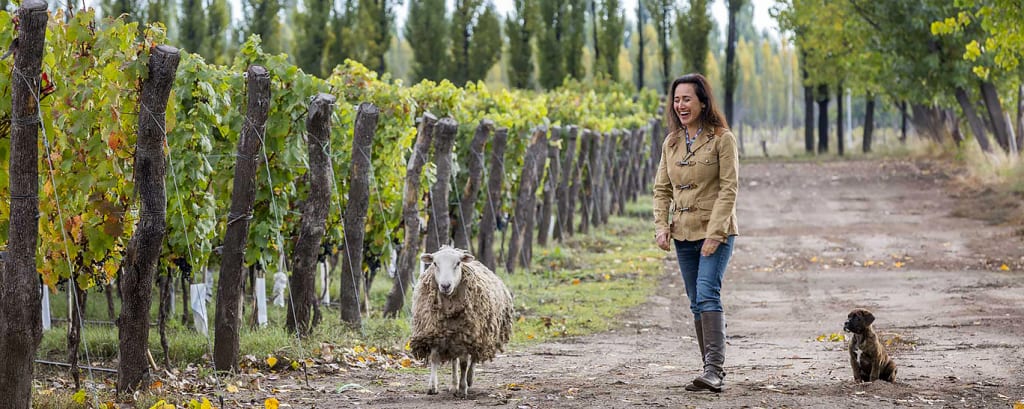Laura Catena interview Part Two
Interview with the face of Argentinian wine

Dr. Laura Catena is the managing director of Bodega Catena Zapata and often called the face of Argentinian wine. A fourth-generation vintner, she also is a magna cum laude grad from Harvard and earned a medical degree from Stanford. She practiced medicine in San Francisco for 25 years while helping run the family winery.
Laura is the spokesperson for the Catena brand. The winery also produces wine under the Alamos label distributed by E&J Gallo in the U.S., and is the Catena wine you are most likely to find. Laura also has her own brand, Luca.
• Was it your idea or a collaborative idea to develop high altitude vineyards?
My father was the first person in Argentina to understand that higher altitudes held the key to making terroir driven, age-worthy, grand cru level wines. This is related to higher natural acidity at higher altitudes, more limestone in the soils and more intense sunlight which results in more polyphenols. He planted in the high part of Gualtallary (Monasterio) at almost 5,000 feet elevation a decade before it became known as perhaps the best vineyard location in Argentina. Once others realized the quality advantage of the Uco Valley, there was a move by many producers and today 80% of the wines coming from Mendoza are grown in the Uco Valley (it was the reverse, with more grapes being grown in Lujan de Cuyo and the East of Mendoza 20 years ago).
• What are the advantages and disadvantages of high altitude grape growing?
Mostly advantages: cool climate (higher natural acidity), intense sunlight (leads to thicker skins = more tannins), well drained stony, limestone soils (low yields, no rot). There is a risk of frost which can be remedied by planting on a slope, but the risk is always there.
• Do you consider yourself first a grape farmer, or a winemaker, or a marketing spokesperson, or the leader of a large and successful business?
I consider myself a farmer who pays the bills and spreads joy by making and selling delicious wine.
• If you could have one super power, what would it be?
To understand and speak animal and plant language.
• What is the greatest challenge facing Catena and the wine world in general?
Water shortage related to climate change.
• What is the greatest joy you have in life?
Watching other people thrive, which includes my children.
• What are Bodega Catena Zapata’s positions on sustainable farming, biodynamic methods, and environmental responsibility?
We call our winemaking philosophy CATENAMICS. The CATENAMICS mission: elevate Argentine wine for another 200 years.
The CATENAMICS method is to use science to preserve nature and culture. Catena means “chain” or “connection” in Italian/Latin. “Amics” from the Greek, refers to “law” or “management". CATENAMICS is our way of managing the connection between plants, soil, ecosystem and people.
When I started working in wine, people would always ask me: “Are your wines biodynamic, organic, sustainable”? I found biodynamics very interesting, especially because its advocates emphasized that it made better wine while at the same time protecting the environment. But I asked myself: should we apply in Argentina a philosophy that originated in Germany at the beginning of the 20th Century? Our mountain climate, our vineyard microbes, our animals and plants, our people and our traditions are different. And that is how the concept of CATENAMICS was born, with the method of using science.
I founded the Catena Institute of Wine in 1995—a serious viticultural and winemaking research institute in Mendoza which publishes in major science journals and collaborates with academics all over the world, to preserve nature and culture (our nature and our culture—but the method can be used anywhere). About half our vineyards are organic certified.
As part of our CATENAMICS philosophy we created a Sustainability Code for Argentina in 2008 which we shared with the industry by forming a collaboration with Bodegas de Argentina. Today the Bodegas de Argentina Sustainability Code is used by hundreds of wineries in Argentina. Through this code we have found ways to collaborate with other producers on vineyard management, water preservation, education programs, bottle weight, carbon emissions. We are currently working on a carbon calculator that we plan to share with the wine industry. All our research is published and shared with the local wine community.
• What is Catena’s position on lighter glass bottles?
We have reduced our overall bottle weight by 30% over the last 10 years and we are in the process of reducing by 15-25% our remaining bottles. We are working with the local manufacturers to reduce weight. We are lucky in Argentina to have an efficient and well functioning glass-production industry with several manufacturers, which means that 100% of our glass is locally sourced.
• What decision gave you the most satisfaction/pride operating Catena?
We recently received the #1 World’s Best Vineyard in the world award from World’s Best Vineyards. I was completely surprised. It is an award given to a winery for a combination of extraordinary wines and original/top level hospitality. I took the scarf (given to me at the award ceremony) and the trophy around the winery and to the vineyards and took photos with all the staff at Catena. I am also going on a tour to visit customers and take the photo with them, because they are part of our success. It made me very happy to be able to celebrate with all the people who work so hard every day and should be recognized for their efforts. It was also very satisfying when we got our first 100 point rating for Adrianna Vineyard River Stones Malbec. It was a milestone in my father’s vision to make Argentine wines that could stand with the best of the world. I’ve written three books about wine and each time I had a lot of doubt about it because of how time consuming it is to write a book (especially when I had my two jobs, wine and medicine, and a young family). But I learned so much while writing each book, and each book became a powerful tool to tell the stories behind Argentine wine, especially the last book Malbec Mon Amour, which was a bestseller in Argentina and got a wonderful review from the New York Times.
Tasting notes
• Bodegas CARO ‘Caro’ Mendoza 2017: Full body, plenty of substance, concentration. Mostly malbec. Very tasty in the dark fruit arena. A Catena-Rothschild joint effort. $59-65
Link to my review https://www.gusclemensonwine.com/bodegas-caro-caro-mendoza-2017/#more-13512
Last round humor
• How does a flower whistle? Through its tulips.
• Neo-Prohibitionist: “Alcohol—wine, beer, spirits—are your enemy.” Jesus Christ: “Love your enemy.” That settles it for me.
• What do you get if you cross a lion with a watchdog? A terrified postman.
Email: [email protected]. Newsletter: gusclemens.substack.com. Website: gusclemensonwine.com. Facebook: Gus Clemens on Wine. Twitter: @gusclemens
About the Creator
Gus Clemens
Nationally-syndicated humorist/wine writer. Gus appears in Gannett USA Today newspapers and several online platforms. Writing professionally since 1969, Gus has authored or participated in 20 books in addition to his humor/wine work.






Comments
There are no comments for this story
Be the first to respond and start the conversation.